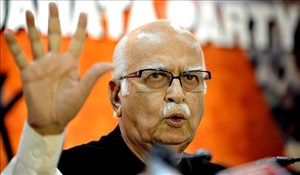
New Delhi, August 12: BJP leader L.K. Advani Sunday called upon President Pranab Mukherjee to take the initiative for bringing the country out of "perpetual election mode" and ensure simultaneous polls to the Lok Sabha and state assemblies every five years with fixed term for the legislatures.
In the latest post on his blog, Advani said successive elections to state assemblies was not good for governance and polity as it influences decision making.
The Bharatiya Janata Party (BJP) leader said he had discussed the issue of electoral reforms in 2010 with Prime Minister Manmohan Singh and Mukherjee, the then Leader of House in the Lok Sabha, and both were receptive to his suggestion that there should not be midway dissolution of either the Lok Sabha and state assemblies and they should have a fixed tenure.
"For the non-partisan responsibility Pranab Da has just assumed, taking an initiative regarding electoral reform would be very appropriate," he said.
"Let the new Rashtrapati take an initiative with regard to poll reforms in their totality, but more specifically in respect of this particular matter which we had once discussed," Advani said.
"Let the present government in which he himself has been a principal player accomplish this one thing at least: a fixed tenure for Lok Sabha and state assemblies, and simultaneous elections at the centre and states every five years," he added.
Advani noted that the United Progressive Alliance's (UPA) term will end May 2014 but 12 states have seen elections since the 2009 Lok Sabha polls and two more are expected to go to polls before the end of 2012.
"In a way, for those running the Union Government this vast country of ours with its huge population is in a perpetual election mode. When for six years we were in the NDA Government we actually experienced how impending elections even in a remote corner of the country used to influence decision making in New Delhi. I feel this is not good either for governance or for the polity," Advani said.
The BJP leader said first general elections in India and assembly elections were held in 1952, and this was repeated in 1957, 1962 and 1967.
The fifth general elections were due in 1972 but were held in 1971 due to the Lok Sabha's early dissolution at the insistence of the Indira Gandhi government, but assembly elections took place as scheduled in 1972, thus leading to "the initial delinking" of the two.
Advani also said that the use of Article 356 - which empowers the union government to dissolve a state assembly if it concluded that the government in the state was not being carried on in accordance with the Constitution - had resulted in the delinking of the election programme of different states.
Referring to the election system in the US where the election date is fixed, Advani said that the exact date of elections should not be arbitrarily decided by the executive.
Advani added that during his discussions on the issue of simultaneous elections with the prime minister and Mukherjee, he had indicated that the British government was also thinking in the same direction and their parliament had also passed a law in this direction in 2011.





Comments
Add new comment